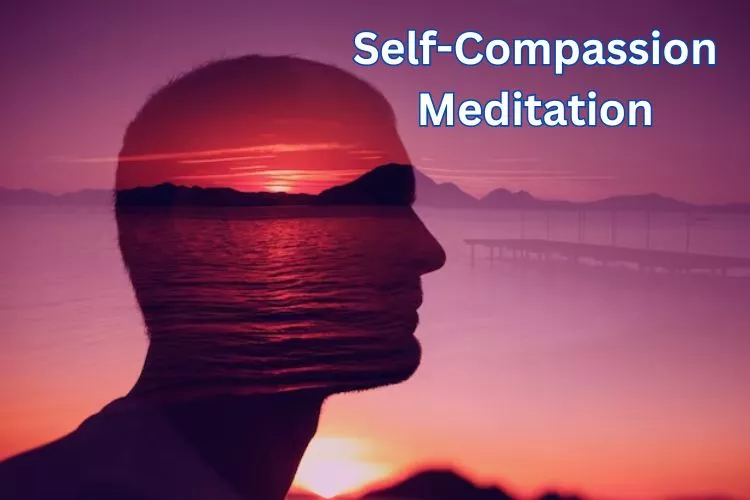How Does Mindfulness-based Stress Reduction Help To Control Stress And Anxiety?

With the constant jumbled thoughts and chatter in our minds and with the hustle-bustle of modern-day life, the idea of self-compassion sounds like a lightyear away. Possibly, a distant emotion which we will achieve sometime in the future. But it’s also worth taking a chance to speak, treat, and judge ourselves with a little more gentleness and kindness. We most likely do that with the outside world and the people we love, but what about ourselves?
Compassion is something we need to cultivate. If asked why, it is mainly because it is an innate quality, waiting for us to tap it. Our fast-moving lives, the obligations we have to serve, our own internal struggles bury that quality deep inside. Our compassion blooms only when we shush our minds and create some mental space that our compassion blooms. By practising meditation on self-compassion, we can control our thoughts and chatter, thereby letting our compassion come to the forefront.
What is Self-Compassion Meditation?
For all the flaws, insecurities, inadequacies, downfalls, you cannot judge and criticize yourself mercilessly. By practising self-compassion meditation, you are trying to be kind and understanding when you see yourself failing. And who said you need to be perfect? We all are imperfectly perfect in our own way!
The Three Elements of Self-Compassion
Self-compassion does not necessarily mean self-obsession. You can love yourself wholeheartedly and still be modest about it. Self-pampering sessions are relaxing and very much needed. But it’s also a feeling and not a showoff.
Self-Kindness vs Self-Judgment
When we fail and fall or suffer and feel inadequate, self-compassion comes into the picture. It entails being warm and understanding toward ourselves rather than ignoring our pain or neglecting ourselves with self-criticism. Self-compassionate people know that being imperfect or failing or facing difficulties is all part of life which is inevitable. They don’t curse themselves or their luck; instead, they adjust and are gentle with themselves. It is important to learn to let go and move forward when confronted with painful experiences rather than getting angry when life falls short of set ideals. Life is not a bed of roses, and even if it is, roses don’t come without thorns. Getting exactly what you want in life is not possible. When this news piece is not accepted, your suffering increases in the form of stress, frustration, and self-doubt. When you embrace this reality with sympathy and kindness, greater emotional calmness is experienced.
Common Humanity vs Isolation
When things don’t happen the way you want them to, it is completely rational to get frustrated. But that is often accompanied by an irrational or rather a pervasive sense of isolation – as if “I” am the only person suffering or making mistakes. Not saying that your suffering and mistake are small or big, but all humans suffer. The very definition of being “human” means that one is mortal, vulnerable, and imperfect. Therefore, practising self-compassion plays a vital role. The medication of self-compassion involves recognizing that suffering and personal flaws are part of the shared human experience, something that all humans go through and not something that happens to “me” alone.
Mindfulness vs Over-identification
Self-compassion meditation also means taking a balanced approach to your negative thoughts and emotions so that your feelings are neither suppressed nor exaggerated. This will make room for relating your personal experiences with those suffering and outs your situation into a larger perspective. It also shows that you are willing to acknowledge your negative thoughts and emotions with transparency so that they are held in mindful awareness. Mindfulness is a non-judging zone. You observe your thoughts and feelings as they are, no matter positive or negative, without trying to suppress or deny them. You cannot play see-saw where you feel your pain and compassion for it at the same time. Mindfulness basically requires that you are not overwhelmed or over-identified with thoughts and feelings, because of which you are caught up and swept away by negativity.
Self-Compassion Guided Meditation and Exercises
Exercise 1: Treat Yourself How You Would Treat Your Best Friend
You console them when they are sad, hug them when they cry, and instantly slap them if they talk bad stuff about themselves; you love them despite all the flaws, right? Then why don’t you treat yourself the same way? Practice Self- Compassion meditation and embrace yourself.
Exercise 2: Self-Compassion Break
No one is asking to bathe in love and apply kindness cream or wear gentle clothes. You can take breaks from self-compassion meditation and act crazy for a while, eating junk food and blaring rock music.
Exercise 3: Exploring Self-Compassion through Writing
We all have our flaws and something that we don’t like about ourselves; something that makes us feel insecure and not good enough. Write yourself a letter about this issue and then address it like you would if your friend sent you that. It should come from your heart, a place of acceptance and compassion.
Exercise 4: Supportive Touch
It is said that, on average, a human being needs 8 hugs in a day. You might not know, but a supportive touch can help you feel calm, cared for, and safe. Practising self-compassion meditation is the next best thing; hugging will always be on the top.
Exercise 5: Changing Your Critical Self-Talk
It is not wrong to point out and realize your own mistakes. It is actually an excellent habit. But, what you should learn is to acknowledge your self-critical voice and reframe the comments in a more friendly way. This will eventually form the blueprint for changing how you relate to yourself in the long run.
Exercise 6: Self-Compassion Journal
Journaling your day-to-day hurdles through a lens of self-compassion meditation can enhance both your mental and physical well-being. Doing this exercise, self-kindness, common humanity, and mindfulness will become part of your daily life.
Exercise 7: Identifying What We Want
Once you know what you want, remember to motivate yourself by a loving approach as it is more powerful than fear. Choose the words you say to yourself very wisely.
The Benefits of Self-Compassion Meditation
To become more in sync with your body and mind, Self-Compassion Meditation acts as a great tool. It not only teaches you to be more gentle and kind to yourself and treat yourself as your best friend, but the practice also brings about other important benefits. Here are some;
Improved Relationships
When you practice self-compassion meditation, you become kinder and more compassionate towards yourself. This has a ripple effect that extends into our everyday lives and therefore improves our relationship with ourselves and others.
Improved Sense of Body Image
You should treat your body like a temple. Just like you won’t enter without removing your footwear, in the same way, don’t let the insecurities and negative thoughts enter your mind and body. When you become self-compassionate, you tend to have a better relationship with your own bodies.
A Healthier Relationship With Food
When you love yourself, be kind and gentle to yourself, your approach towards eating will be more intuitive, and thus you will have a healthier relationship with food.
In Conclusion
Getting waxed to get the smooth skin, facials, and hair spas to look pretty all may change you in a way that allows you to be more healthy and happy. But, you doll up and pamper yourself because you care about yourself, right? Not because you don’t accept yourself just the way you are.
Most importantly, self-compassion means that you honour and accept the human within you
Talk to our Experts Astrologers and Get 100% Cashback on your First Consultation



